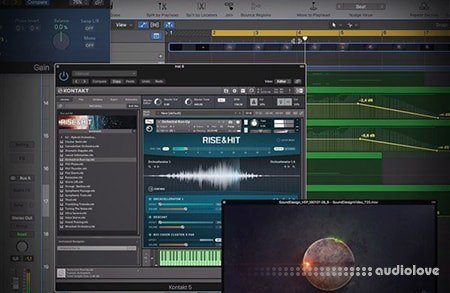Groove3 Sound Design for TV Film and Games [TUTORiAL]

P2P | 05 May 2018 | 1.08 GB
In this Groove3 video tutorial series, sound design guru Gary Hiebner shows you what it takes to do sound design for TV, Film and Games!
Gary starts by welcoming you and gives an introduction to what sound design for media such as TV, Film & Games is, plus a demo of the song that will be created in the series.
Then, Gary starts at the beginning, showing you how to import video into your DAW, create hit pPoint markers, decide on a tempo, and how to find and sync sound effects to your video.
Gary now shows you how to use sound effects that sync with moving animated parts in a video, followed by how to use whoosh sound effects to sync up with elements in a video, and how you can use time stretching techniques for differentiation in the sounds.
You’ll then see how to use risers and build ups as sound effects, piano melody and chord progression creation, adding strings and choirs, building up the rhythm with drums and bass, adding percussion, horns, synths, swells and more!
Wrapping it up, Gary walks you through creating dynamics with the mix and exporting and imbedding your audio to video, so you can supply it to the client or production team.
See the individual tutorial descriptions for more info. If you want to know what’s involved when doing sound design for different media and mediums, checkout “Sound Design for TV, Film & Games” today.
home page
Gary starts by welcoming you and gives an introduction to what sound design for media such as TV, Film & Games is, plus a demo of the song that will be created in the series.
Then, Gary starts at the beginning, showing you how to import video into your DAW, create hit pPoint markers, decide on a tempo, and how to find and sync sound effects to your video.
Gary now shows you how to use sound effects that sync with moving animated parts in a video, followed by how to use whoosh sound effects to sync up with elements in a video, and how you can use time stretching techniques for differentiation in the sounds.
You’ll then see how to use risers and build ups as sound effects, piano melody and chord progression creation, adding strings and choirs, building up the rhythm with drums and bass, adding percussion, horns, synths, swells and more!
Wrapping it up, Gary walks you through creating dynamics with the mix and exporting and imbedding your audio to video, so you can supply it to the client or production team.
See the individual tutorial descriptions for more info. If you want to know what’s involved when doing sound design for different media and mediums, checkout “Sound Design for TV, Film & Games” today.
home page
Only registered users can see Download Links. Please or login.


No comments yet